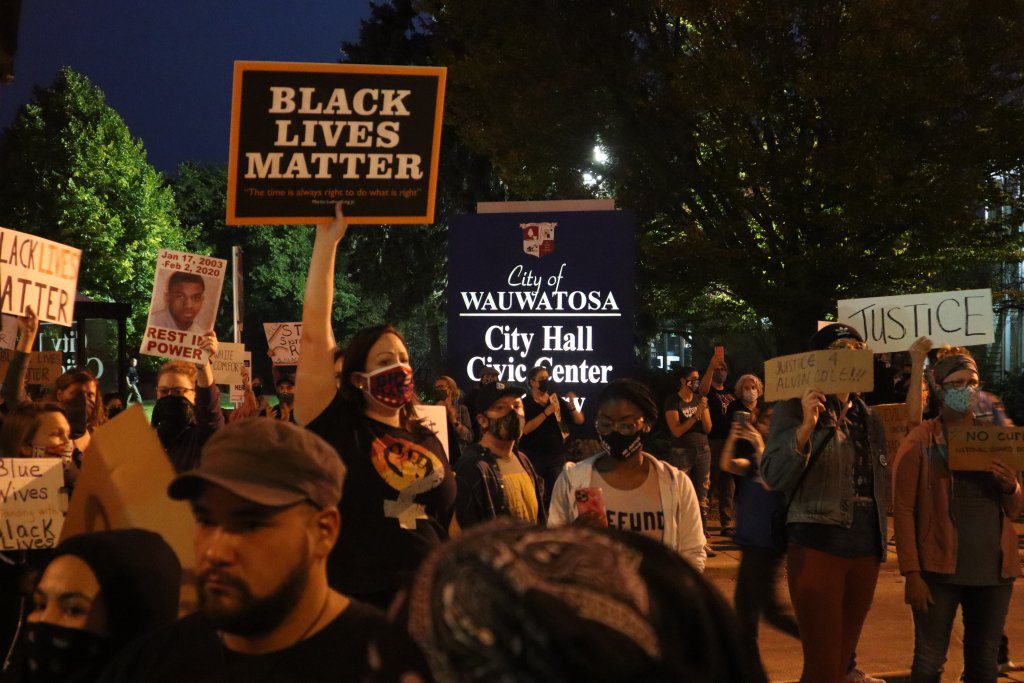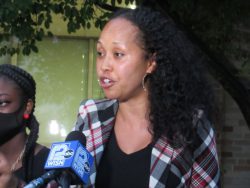Lawsuits Over Wauwatosa Curfew, Surveillance Move Forward
A federal judge will allow court to consider claims related to handling of 2020 protests.
A federal lawsuit filed against the city of Wauwatosa’s handling of protesters during its October curfew in 2020 continues to unfold in court. While U.S. Magistrate Judge Nancy Joseph decided that nine of the lawsuit’s 14 claims will not go forward, the claims the court will consider touch on some of the most discussed controversies still lingering after two years.
The ongoing lawsuit, filed by attorney Kimberley Motley and others, is one of many sparked by protest enforcement in 2020. Following the killing of George Floyd, people across southeastern Wisconsin took to the streets protesting cases of police killings and misconduct. Wauwatosa’s protests centered around a trio of fatal shootings over a five-year period by former officer Joseph Mensah. Demonstrations occurred in Wauwatosa all summer and into the fall and winter, carrying over into 2021. In November 2021, Mensah resigned from the Wauwatosa Police Department (WPD), and was later hired by the Waukesha County Sheriff’s Department.
Many of WPD’s activities, and the city’s decisions, have become the subjects of various lawsuits. Claims include excessive force and allegations surrounding a list of protesters that also included lawyers and journalists maintained by WPD. Motley’s lawsuit alleging excessive force, an unconstitutional curfew, surveillance, harassment and other claims has seen four amended complaints.
While Motley’s curfew lawsuit is still alive, other attorneys have had their cases centered on excessive force and defamation of protesters dismissed. Nearly two dozen tickets issued against protesters in Wauwatosa for violating the October curfew have also been dismissed.
Motley emphasized that some important claims in her lawsuit survived the judge’s vetting. “A really important claim was whether or not this curfew was constitutional,” Motley told Wisconsin Examiner. It’s a question which has endured ever since it was revealed that Wauwatosa’s common council was largely left out of the preparations for the curfew. Instead, those preparations largely involved the police department and city officials including Mayor Dennis McBride. Over 31 plaintiffs, as well as The People’s Revolution (TPR) protest group, will be allowed to challenge the constitutionality of the curfew.
Another 49 of the plaintiffs will also be allowed to challenge the protester list, which was also called a “target list” within the department. The list compiled personal information about people including names, addresses, phone numbers, social media accounts, car make and model details and notes about spouses and siblings.
Some of the information was collected through Department of Transportation databases, and included information protected by the Driver’s Privacy Protection Act (DPPA). “[Plaintiffs] allege that the information was used to effectively create a list of people to harass and surveil,” Judge Joseph writes in the order denying the city’s motion to dismiss the lawsuit. “It is entirely unclear how dissemination of this information served a role in some legitimate law enforcement function, such as deterring, preventing, or investigating crimes. Thus, at this juncture, I find the plaintiffs sufficiently state claims under the DPPA.” WPD did not respond to a request for comment.
The list, created by WPD crime analyst Dominick Ratkowski, was shared to numerous local and federal law enforcement agencies including the FBI. “You can’t just carte blanche have a list of people just because you feel like it,” said Motley. “You need to have a legal basis for it.” More than 50 plaintiffs will be allowed to move forward to challenge the DPPA violations related to the list’s dissemination, with those allegations levied against WPD LT. Joseph Roy and Ratkowski.
A single plaintiff, William Rivera, is also allowed to move forward with allegations of a discriminatory arrest. Rivera was on his way home from work when he encountered militarized officers. After his car was surrounded and Rivera arrested, he was told his race was the reason for his arrest. Three more plaintiffs will also move forward with claims of malicious prosecution involving WPD Lt. Jeffrey Farina, who retired after the protests subsided. Farina served as a field commander during the October curfew.
Mayor McBride says the lawsuits that were thrown out in recent weeks strengthen the city’s case. McBride was further reassured when the judge threw out a majority of the claims made in Motley’s lawsuit. “She only allowed a few claims to go forward, deciding that they met the minimum standards for pleading a case,” McBride told Wisconsin Examiner. “When the city files a motion for summary judgment, the plaintiffs will have to prove, with evidence, that their few remaining claims have merit.”
McBride also feels the dismissal of the Radke case supports the argument that “the city did not violate the protesters’ First Amendment rights because the curfew was a reasonable ‘time, place, and manner’ restriction during a time of emergency following the Kenosha unrest.” McBride stressed that “from the beginning, it has been the city’s position that the Knowlton, Henry and Radke cases lack legal and factual merit. We are pleased that the court decisions we have received support that position.”
While there’s a possibility Motley’s case will go to trial, the judge may also rule on some claims outright. “This is a big case, with a lot of really important legal and constitutional issues,” Motley told Wisconsin Examiner. “Although this lawsuit is 69 people, it represents the community. And it represents how there were numerous constitutional and legal violations by the city of Wauwatosa, as well as Dennis McBride as it relates to protesting and what we believe was an unlawful curfew in Wauwatosa. There’s a bigger picture here.”
As the lawsuit continues to play out, the city has hardened its defenses. In December 2020, the protests and unrest surrounding Mensah’s shootings were considered in an official statement by the Municipal Securities Rulemaking Board (MSRB). Page 33 of the statement notes that the city increased overtime pay to police to quell the 2020 protests.
“The city believes it may face civil litigation from such shootings as well as litigation resulting from the city’s response to civil unrest,” it states. The statement covers both the protests after Mensah’s shootings and ongoing lawsuits stemming from a 2018 case of a Black teen detained by a Wauwatosa officer, who believed the teen was robbing his grandmother, who was white. “The city expects that its insurance coverage will apply in all such matters to significantly reduce its risk,” the section concludes, “but the city cannot predict the outcome of any such matters.”























